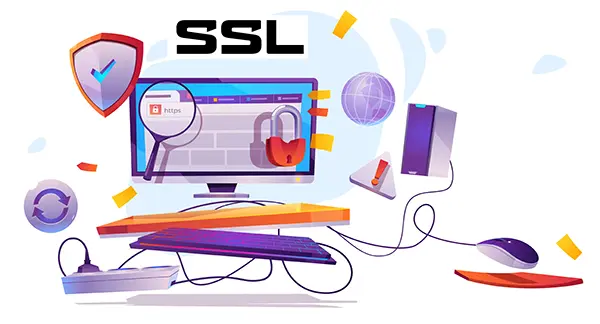
An SSL certificate is essential to ensure the security of a website. Google, for example, has taken steps to inform users about page protection practices. A company that does not have a digital document appears as “unsafe” to people.
What does that mean? Having an SSL certificate is a way to protect users’ data and guarantee a more significant number of accesses to the website. You still don’t use this tool in your business? Read on and understand more about the subject!
What is an SSL certificate?
SSL certificate is a technology used to protect the information of people who access a website. The acronym SSL stands for Secure Socket Layer, a global security standard that uses encryption between the web server and the browser.
Thus, the encryption system prevents access to data by malicious people. Many people recognize the certificate as a padlock that appears before or after the website address. Note that this symbol may appear in different places depending on the browser you are using for your search.
What is the SSL protocol for?
As mentioned earlier, SSL stands for Secure Socket Layer. This system ensures the exchange of information between computers securely. The acronym, then, makes three criteria available to the user:
- privacy from hackers who might try to spy on your data;
- integrity to prevent falsification of information;
- authentication that ensures the integrity of the company holding the SSL certificate.
Why should a company have an SSL certificate for its website?
The technology provides more security for the owner of the page and the users who access it. In addition, the Google search engine has changed its website identification system to show the user clearly and precisely that it is not inviolable.
In this way, websites with the acronym “HTTP” are no longer considered neutral but insecure. That’s because they allow anyone to make changes to the page before the user notices.
This new Google policy, then, ensures that people who are not technically savvy can protect themselves. Therefore, the company that does not use a certificate will appear insecure to users (as shown in the example below). And that’s not what you want.
The “HTTP” standard has been helpful to users for many years. However, the increase in cybercrime has created the need to avoid any vulnerability. Therefore, those who want to guarantee the credibility of their business need to adopt the “HTTPS” models. They are secure and show that there is an encryption system to authenticate the server. Another advantage of this feature is increasing page visibility by up to 5% in search engines.
In summary, the SSL certificate ensures many benefits for the company:
- competitive advantage by protecting customer data;
- assuring users that information will not be tampered with;
- security with a robust encryption system.
What are the main SSL certificate types?
Before choosing a certificate for your company, it is vital to know the main differences between the models. In addition, you need to have the assistance of a certification authority to obtain this validation. Understand more below:
DOMAIN VALIDATION
This is the most basic and cheapest SSL model. It uses a more straightforward encryption system, being issued quickly by the certifying authority. How does this happen? It only validates if the domain exists by comparing the information with the database registered in the responsible agency.
This process is carried out automatically. The template is suitable for personal blogs and simple websites that do not trade online.
ORGANIZATION VALIDATION
To obtain this type of certificate, the company goes through a few more validation processes. The domain is authenticated, but so is the organization behind it. Thus, the certificate authority verifies whether the company is the domain’s legal owner and whether it is competent to receive the certificate.
This is the certificate model indicated for those who carry out e-commerce operations, as it uses more complete validation criteria.
EXTENDED VALIDATION
This is the most robust SSL certificate template. The authority takes a closer look at the company, such as the institution’s name, address, telephone number registration.
This certificate has the highest level of security for the business and its customers. It activates a green bar in the browser and identifies the company name. This model goes a long way towards building a company’s reputation and reliability and can help increase sales. The extended validation certificate is recommended for financial institutions, government agencies, and large e-commerce stores, as they deal with sensitive customer data daily.
Do you regularly check the SSL validity on a website you visit? Let us know your thoughts in the comment section below!
